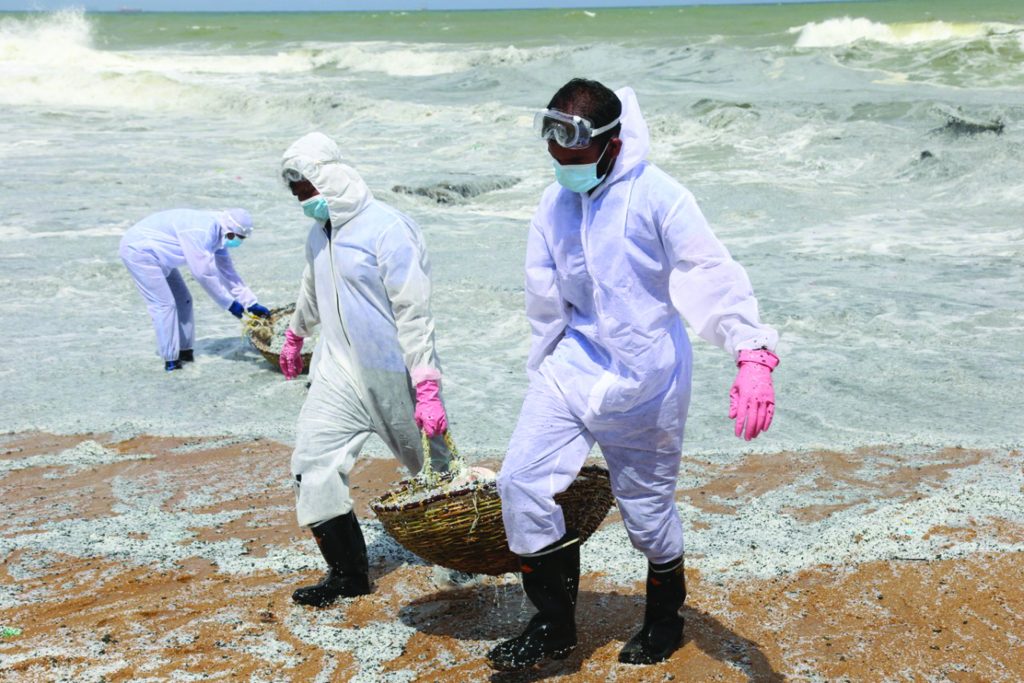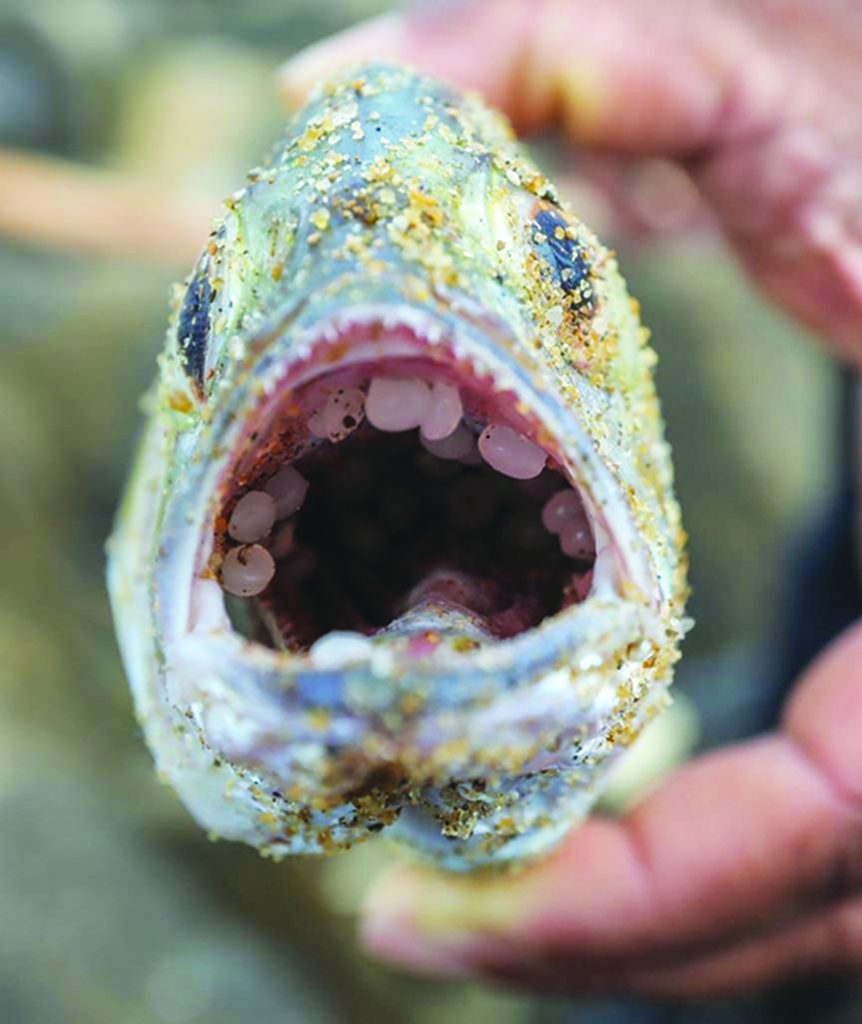Months after a container ship carrying toxic chemicals caught fire off the west coast of Sri Lanka, fisherfolk still suffer from the dreadful aftereffects of the country’s worst marine ecological disaster
This article is by Oscar Amarasinghem (oamarasinghe@yahoo.com), chancellor of the Ocean University of Sri Lanka, and president of the Sri Lanka Forum for Small Scale Fisheries (SLFSSF)
A 186-m-long container ship called X-Press Pearl, registered in Singapore, arrived in Colombo, Sri Lanka, on the night of 19 May 2021, carrying 1,486 containers. The next day, it was reported that the ship caught fire. At that time, it was located 9.5 nautical miles northwest of the Colombo port. Five days later, a large explosion occurred inside the vessel; by late afternoon, containers were dropping off the vessel into the sea. On 2 June, the ship finally sank.
The incident was deemed the worst marine ecological disaster in Sri Lankan history. The ship’s cargo included, among others, 12,085 metric tonnes (MT) of plastics and polymers, 8,252 MT of chemicals and 3,081 MT of metals. After the ship caught fire, its debris, burnt goods and plastic pellets washed ashore in large quantities. Dead fish, turtles, whales and dolphins were found along the western coast. Fish appeared with plastic pellets trapped in their gills. Initially noticed along the coast of Negombo, ship debris, and dead fish and turtles, washed up in other locations hundreds of kilometres to the north and south, indicating the widespread nature of the damage.
Blindsided
A day after the ship caught fire, the Department of Fisheries banned fishing in the coastal strip between Kalutara district and Negombo district. The disaster affected 12,731 fishers engaged on 4,612 coastal craft—both skippers and crew. Apart from those directly involved in fishing, this event also afflicted large numbers of stakeholders in the fisheries value chain, including those in ancillary services. Overall, 63,563 people have been affected by the accident, based on calculations by civil society organizations.

The enforcement on 21 May of the fishing ban resulted, overnight, in a series of shocks to the fishing community. Families lost their main source of income; the supplementary income from women workers was also curtailed; and demand for fish consumption dropped suddenly in response to fears of contamination. Since the ban put the entire local economy into a collective shock, traditional sources of insurance disappeared at once, leaving fishing families with no community assistance. Fishers lost assets like fishing gear. The combined effect was a dramatic loss of well-being.
The devil in the details
The fishing community’s immediate response was to tighten the belt, reducing consumption. Such measures put additional pressure on women, traditionally accustomed to shoulder the burden of household-consumption shortfalls. Nevertheless, food insecurity leads to nutritional insecurity, which has a tumble-down effect on children’s nutrition. It is difficult to imagine how the affected households managed to pay regular bills—house rent, electricity, water and goods taken on instalment, among other things—that amount to a monthly average of about Sri Lankan Rupees (SLR) 20,000 (US$ 100).
Since the ban put the entire local economy into a collective shock, traditional sources of insurance disappeared at once, leaving fishing families with no community assistance
Parental care has suffered, too. In Sri Lankan society, parents usually live with their children in their old age. Expenses related to such care-giving can be excessively high. In a time of distress, entire families get cut off from leisure activities, films, pleasure trips, and social and religious obligations. This snowballs into increased psychological stress on all members of the family. All of this cannot be quantified in value terms.
In the absence of insurance markets for fishing-related risks, people resort to credit. In fishing societies, exchange of small loans is very common. However, the ship disaster hit everyone equally; the fishing community lost its insurance function. In such conditions, people tend to mortgage jewellery, liquidate assets or borrow from moneylenders who charge exorbitant rates of interest, as high as 180 per cent per year.

Since the day the fishing ban was imposed, the debt of fishing households began accumulating. Defaults on instalments for repayment added to the pressure on households, exacerbating suffering and misery.
COVID-19 and blue washing
A ship disaster of this scale is a calamity at any time for vulnerable fishing communities. The timing of this particular one in Sri Lanka, however, could not have been worse. The fishing community on the western coast had already been reeling under the broad-spectrum destruction of COVID-19. The pandemic’s first wave jolted all the links in the fish value chain, dismantling almost all of them. Curfews to prevent new infections, lowered demand for fish, falling prices and disruption in the markets had all hit fishing activities seriously. Operations got downsized by 45-65 per cent.
The second wave of the pandemic hit the country in October 2020. A garment factory and the fish market of the western town of Peliyagoda became the eye of the storm, reporting a large number of COVID-19 cases. Rumours began to circulate that fish was a carrier of the new coronavirus; consumers stopped eating fish. Just as the affected population began to recover, the third wave of COVID-19 arrived in late-April 2021. While the weakening economy and stagnant incomes hit everybody, the poorer groups were struck particularly badly. Fishing restrictions and poor demand for fish meant poor income for fishers, leaving their livelihoods hanging by a thread. Particularly hit were the small-scale fishers catering to local markets.
It was in this situation that the Xpress Pearl ship disaster occurred. The new-fangled attempt to marry economic growth with a narrow environmental agenda in the ‘Blue Economy’ paradigm excludes artisanal and small-scale fishers from development decisions that affect them and their future directly.
The absence of any public consultation in the implementation of development projects, coastal land grabs by tourism and other interests, and the marginalization of fishing communities—these are among the complaints most often heard from around the country. Many fishers have lost their beach-seining, craft anchorage and fish-drying sites. These new injustices emerge from the unregulated and undemocratic growth of the Blue Economy.
Fishing households face untold suffering. Food and nutritional insecurity are on the rise; lowered consumption and expenditure on fish are causing misery, families are struggling to care for their old and their young, and debts are accumulating. The fishing ban will continue until the debris is cleared from the seabed by the responsible party. The agony and misery will continue to grow. Besides giving compensation for lost wages, those held accountable for the disaster must be made to pay a premium to cover the numerous economic and social costs suffered by the affected communities.
Importantly, development strategies should be designed to improve the resilience of fishers to external shocks. This requires, among other things, the strengthening of community sources of insurance through, for example, co-operatives; promoting self-insurance strategies like savings, alternative livelihoods and more employment for women; and addressing the social injustices caused by the Blue Economy agenda.
For more
A Beacon of Trust
Oil, acid, plastic
X-Press Pearl sinking shines a light on seafood safety
Sri Lanka: X-Press Pearl sinking shines a light on seafood safety